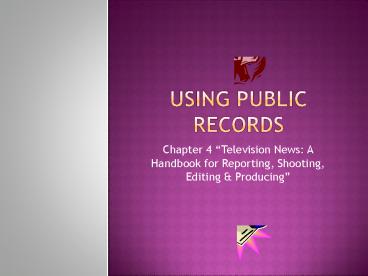Using Public Records - PowerPoint PPT Presentation
Title:
Using Public Records
Description:
Chapter 4 Television News: A Handbook for Reporting, Shooting, Editing & Producing In our country, we have the right to get information that might be considered ... – PowerPoint PPT presentation
Number of Views:87
Avg rating:3.0/5.0
Title: Using Public Records
1
Using Public Records
- Chapter 4 Television News A Handbook for
Reporting, Shooting, Editing Producing
2
Mining for News stories
- In our country, we have the right to get
information that might be considered confidential
or secret in other societies - This unequaled access has developed because our
government is run by the people - There are so many stories buried in public
records, said Tarah Taylor of WCYB-TV in
Bristol, Va. Reporters who know where and how to
look can use them to develop fascinating and
important reports.
3
Care to Car? Anyone can!
- Access to public information is becoming easier
through computer technology - Many government records are now posted on
website, and anyone can access information from a
home computer - Much of this information has always been
available but previously required a trip to the
courthouse and significant research effort - Computer-assisted reporting (CAR) can lead to
important and original news reporting - Reporters need to be knowledgeable about their
rights to records - And they should remember that access to public
information is a hard-won fight and remains a
battleground
4
News sink your teeth
- News departments often focus on stories that can
be done in a day and fail to allocate staffing
and resources for more in-depth news - Bright, energetic reporters should not be
satisfied until they can sink their teeth into
serious, important stories behind the news - Many of these important news stories require
following paper trails and staring at computer
monitors rather than putting microphones in front
of public figures - See story examples pages 88-89
5
Journalism at its best
- Journalism operates at its best in careful
examination of our society, and the potential for
stories is unlimited - Look in the phone book for listings of city,
county and state offices - Police and fire departments court systems,
health departments and others you as a reporter
for a news organization have a right to ask for
documents and records, budget requests and
figures you may attend scheduled meetings where
decisions are made - Much of this information is now available through
agency websites
6
Endless story possibilities!
- What crimes are the most common in the city (or
on campus)? - What restaurants did not pass the last health and
safety inspections? - Where is the next subdivision being built and who
sold the lots and for how much? - What are the salaries of public officials and
city, state (and college) workers? - How much tax money was used to send city
officials to the tourism convention?
7
Getting the good stuff
- Knowing you have the right to access such
information, doesnt mean it will always be easy
to attain - Be courteous but persistent, letting people in
the pertinent offices know you have the right to
their records and that you will go to the very
top to get them - When the resistance is great, reporters can file
a federal Freedom of Information Act request - The FOI Act was passed in 1966 with the intent to
restrict needless government secrecy - Recent local FOI-related use by the media
- FOI exceptions- page 93
- Reporters Committee for Freedom of the Press link
8
Sources of Public Informationpage 94
- Birth/Death Records
- Zoning/Planning Documents
- Building Permits
- Tax Records
- Disclosure Forms for Elected Officials
- Business and Organizational Records
- City Directory
- News Files
- Open courtrooms- p. 97
- Some exceptions juvenile proceedings, grand
jury proceedings p.97-98 - Reporters may cover stories involving federal,
state, county and city courts so need to be
aware of possible different operations - And may cover criminal and civil cases and need
to understand differences
9
Court and Police lingo
- Arraignment
- Preliminary hearing
- Pretrial hearing
- Sentencing hearing
- Disposition
- Subpoena
- Search warrant
- Affidavit
- Plaintiff
- Defendant
- Bond
- Magistrates
- District Attorney
- Circuit Judges
- Superior Court
- Appeals Court
10
C of C sources for news
- College News Releases link
- Presidents Office link
- Board of Trustees link
- Public Safety link
- C of C Publications link
- Community Relations link
- Marketing and Communications link
- Website Index link
- Procurement and Supply Services link































